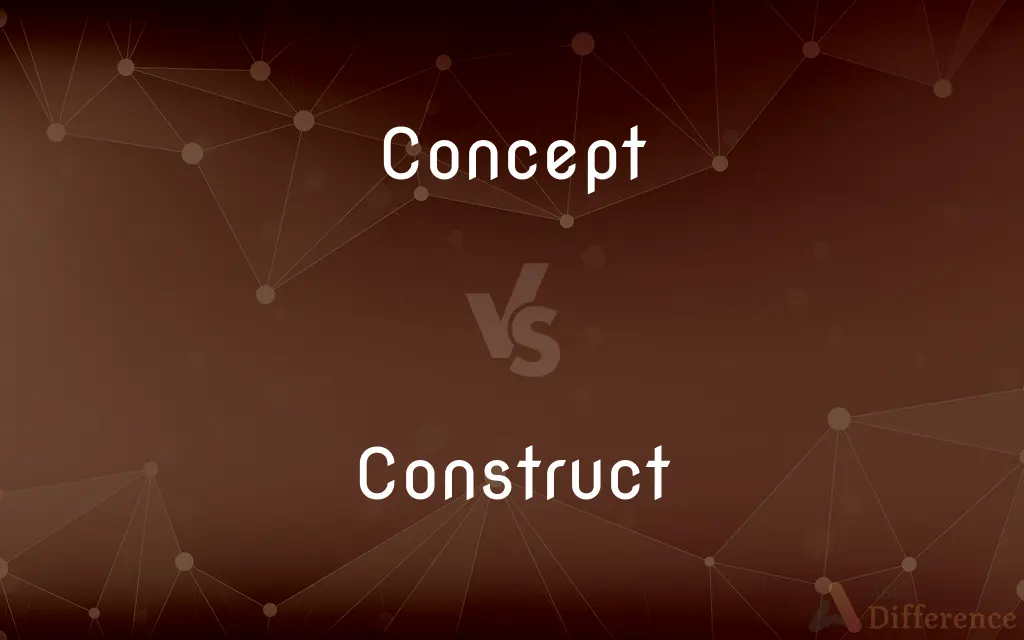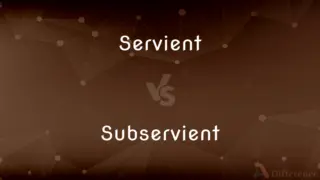Concept vs. Construct — What's the Difference?
By Tayyaba Rehman & Fiza Rafique — Updated on March 9, 2024
Concepts are broad ideas or categories representing objects, events, or phenomena, while constructs are specific, often abstract, and developed for a particular research purpose.

Difference Between Concept and Construct
Table of Contents
ADVERTISEMENT
Key Differences
Concepts serve as the building blocks of thoughts and knowledge, representing general ideas or categories that help us understand the world. For instance, the concept of 'democracy' encompasses the broad idea of governance by the people, for the people. Constructs, however, are more specialized and often abstract ideas developed within specific theoretical or research contexts. A construct such as 'self-esteem' is developed to understand particular aspects of human psychology and behavior in depth.
While concepts are fundamental to both everyday understanding and academic disciplines, allowing for the organization of knowledge into categories and ideas, constructs are typically used within research to operationalize variables, making them measurable and testable. For example, while 'health' can be a concept understood broadly, a construct like 'mental well-being' might be developed to specifically study aspects of health in psychological research.
Concepts are generally more universally understood and can be applied across different fields of study. They form the basis of language and communication, enabling people to convey ideas and information efficiently. On the other hand, constructs are often tied to specific theories or research frameworks and require more precise definitions and measurements, making them integral to scientific inquiry and experimentation.
The development of a construct usually involves a more rigorous process of definition, hypothesis formation, and validation through research, aiming to provide a clear framework for study and analysis. For example, the construct of 'intelligence' involves ongoing debate and research to define its parameters, measure it accurately, and understand its implications. Concepts, in contrast, may not require such a precise or formalized approach, as they are used more broadly to navigate and make sense of the world.
Understanding the distinction between concepts and constructs is crucial for academic and research endeavors. While concepts help in categorizing and making sense of general knowledge, constructs are vital for conducting detailed, specific, and empirical investigations. This differentiation allows for a more nuanced approach to studying phenomena, facilitating the advancement of knowledge and understanding in various fields.
ADVERTISEMENT
Comparison Chart
Definition
A broad idea or category representing objects, events, or phenomena
A specific, often abstract idea developed for research or theoretical purposes
Universality
Generally universal and applicable across different fields
Often specific to particular theories or research frameworks
Purpose
To organize and categorize knowledge
To operationalize variables for research and testing
Nature
More broadly understood and less formally defined
Requires precise definition and operationalization
Examples
Democracy, health, beauty
Self-esteem, intelligence, job satisfaction
Compare with Definitions
Concept
A mental grouping of similar objects, events, or people.
The concept of 'fruit' can include a wide range of edible items.
Construct
A specialized idea developed within a theoretical framework.
'Social capital' is a construct in sociology representing the value of social networks.
Concept
A general idea representing a category of objects or phenomena.
The concept of 'justice' varies across cultures.
Construct
An abstract concept with specific dimensions and measures.
'Quality of life' is a construct that encompasses various aspects of well-being.
Concept
A fundamental principle or idea.
The concept of 'gravity' explains the attraction between masses.
Construct
A theoretical creation for specific research purposes.
'Cognitive dissonance' is a construct in psychology explaining discomfort from conflicting beliefs.
Concept
A broad category that organizes knowledge.
The concept of 'biodiversity' encompasses the variety of life on Earth.
Construct
An operationalized variable in research.
'Leadership effectiveness' is a construct measured in organizational studies.
Concept
An understanding or notion held in the mind.
Her concept of happiness includes both success and well-being.
Construct
A concept precisely defined for empirical testing.
'Emotional intelligence' is a construct involving the ability to recognize and manage emotions.
Concept
Concepts are defined as abstract ideas or general notions that occur in the mind, in speech, or in thought. They are understood to be the fundamental building blocks of thoughts and beliefs.
Construct
To form by assembling or combining parts; build.
Concept
An abstract idea
Structuralism is a difficult concept
The concept of justice
Construct
To create (an argument or a sentence, for example) by systematically arranging ideas or terms.
Concept
A general idea or understanding of something
The concept of inertia.
The concept of free will.
Construct
(Mathematics) To draw (a geometric figure) that meets specific requirements.
Concept
A plan or original idea
The original concept was for a building with 12 floors.
Construct
Something formed or constructed from parts.
Concept
A unifying idea or theme, especially for a product or service
A new restaurant concept.
Construct
A concept, model, or schematic idea
A theoretical construct of the atom.
Concept
Having an experimental or strikingly different design, especially to test or demonstrate new features
A concept car.
Construct
A concrete image or idea
"[He] began to shift focus from the haunted constructs of terror in his early work" (Stephen Koch).
Concept
An abstract and general idea; an abstraction.
Construct
Something constructed from parts.
The artwork was a construct of wire and tubes.
Loops and conditional statements are constructs in computer programming.
Concept
Understanding retained in the mind, from experience, reasoning and imagination; a generalization (generic, basic form), or abstraction (mental impression), of a particular set of instances or occurrences (specific, though different, recorded manifestations of the concept).
Construct
A concept or model.
Bohr's theoretical construct of the atom was soon superseded by quantum mechanics.
Concept
(generic programming) A description of supported operations on a type, including their syntax and semantics.
Construct
(genetics) A segment of nucleic acid, created artificially, for transplantation into a target cell or tissue.
Concept
To conceive; to dream up
Construct
(transitive) To build or form (something) by assembling parts.
We constructed the radio from spares.
A wall constructed of random stones.
Concept
An abstract general conception; a notion; a universal.
The words conception, concept, notion, should be limited to the thought of what can not be represented in the imagination; as, the thought suggested by a general term.
Construct
(transitive) To build (a sentence, an argument, etc.) by arranging words or ideas.
A sentence may be constructed with a subject, verb and object.
Concept
An abstract or general idea inferred or derived from specific instances
Construct
To draw (a geometric figure) by following precise specifications and using geometric tools and techniques.
Construct a circle that touches each vertex of the given triangle.
Construct
To put together the constituent parts of (something) in their proper place and order; to build; to form; to make; as, to construct an edifice.
Construct
To devise; to invent; to set in order; to arrange; as, to construct a theory of ethics.
Construct
Formed by, or relating to, construction, interpretation, or inference.
Construct
An abstract or general idea inferred or derived from specific instances
Construct
Make by combining materials and parts;
This little pig made his house out of straw
Some eccentric constructed an electric brassiere warmer
Construct
Put together out of components or parts;
The company fabricates plastic chairs
They manufacture small toys
Construct
Draw with suitable instruments and under specified conditions;
Construct an equilateral triangle
Construct
Create by linking linguistic units;
Construct a sentence
Construct a paragraph
Construct
Create by organizing and linking ideas, arguments, or concepts;
Construct a proof
Construct an argument
Construct
Reassemble mentally;
Reconstruct the events of 20 years ago
Common Curiosities
What is a concept?
A concept is a broad idea or category that represents objects, events, or phenomena, serving as a fundamental building block of knowledge.
How do concepts and constructs differ?
Concepts are broad and universal ideas used to organize knowledge, while constructs are specific, precisely defined, and developed within research or theoretical frameworks.
Can a concept become a construct?
Yes, a concept can evolve into a construct when it is specifically defined and operationalized for research purposes.
Why are constructs important in research?
Constructs are important because they allow researchers to operationalize variables, making abstract ideas measurable and testable, which is crucial for scientific inquiry and experimentation.
What is a construct?
A construct is a specific, often abstract idea that is developed for particular theoretical or research purposes, requiring precise definition and operationalization.
Are concepts used outside of research contexts?
Yes, concepts are used in everyday understanding and communication across various contexts, helping people categorize and make sense of the world.
Can constructs be directly observed?
Often, constructs cannot be directly observed; they are inferred from observable behaviors, outcomes, or measurements that relate to the theoretical idea.
How are constructs developed?
Constructs are developed through a rigorous process of theoretical definition, hypothesis formation, and empirical testing to ensure they are precisely defined and measurable.
How do constructs affect the validity of research?
The development and operationalization of constructs are crucial for research validity, as they ensure that what is being measured accurately reflects the theoretical idea being investigated.
Can there be multiple constructs within a single concept?
Yes, a single concept can give rise to multiple constructs as researchers develop specific, measurable dimensions to study various aspects of the broader idea.
Share Your Discovery

Previous Comparison
Journey vs. Travel
Next Comparison
Servient vs. SubservientAuthor Spotlight
Written by
Tayyaba RehmanTayyaba Rehman is a distinguished writer, currently serving as a primary contributor to askdifference.com. As a researcher in semantics and etymology, Tayyaba's passion for the complexity of languages and their distinctions has found a perfect home on the platform. Tayyaba delves into the intricacies of language, distinguishing between commonly confused words and phrases, thereby providing clarity for readers worldwide.
Co-written by
Fiza RafiqueFiza Rafique is a skilled content writer at AskDifference.com, where she meticulously refines and enhances written pieces. Drawing from her vast editorial expertise, Fiza ensures clarity, accuracy, and precision in every article. Passionate about language, she continually seeks to elevate the quality of content for readers worldwide.














































